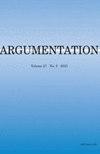Japan’s Strategic Maneuvering in the Fukushima Controversy: The Argumentative Move from the Contaminated Water to the Treated Water
Abstract
This study examines the evolution of arguments surrounding Japan’s administrative decision to release the radioactive wastewater that the Tokyo Electronic Power Company (TEPCO) initially pledged to store and lower the radiation levels on its Fukushima Daiichi nuclear site. In so doing, it focuses specifically on how Japan selected the argumentative move to reconcile the technical and public dimensions of the disagreement about the issue of Fukushima water in strategic maneuvering. The study will provide a critical insight into how Tokyo sought to establish a common ground to release the officially-called “Advanced Liquid Processing System (ALPS) treated water” for the reconstruction of Fukushima. In support of dialectical reasonableness drawn from the sphere of scientific arguments in which a premium is placed on techno-efficiency, the treated water became recontextualized in a technical and administrative sense not just to be distinguished from the contaminated water in a rhetorically effective way, but to be more generally and more relevantly accepted in a wider public.

 求助内容:
求助内容: 应助结果提醒方式:
应助结果提醒方式:


